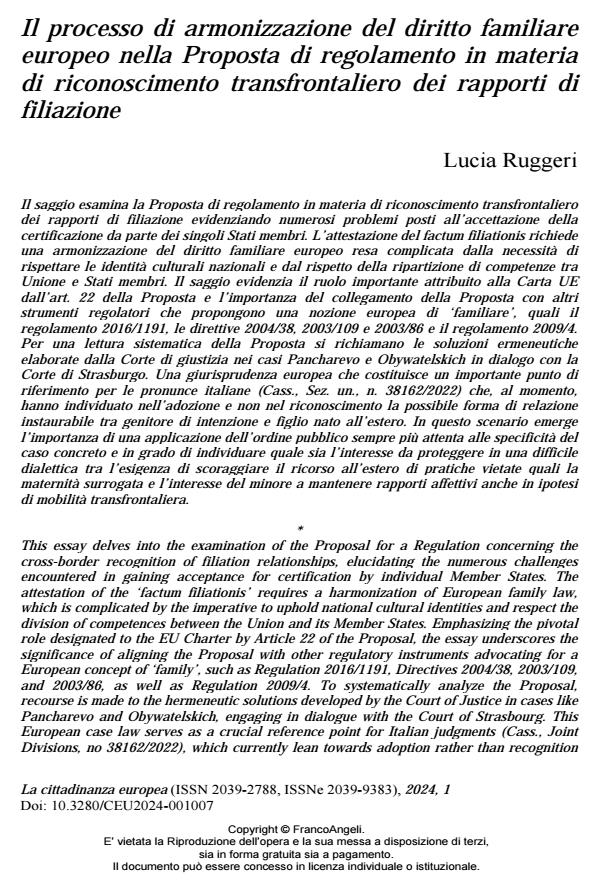Il processo di armonizzazione del diritto familiare europeo nella Proposta di regolamento in materia di riconoscimento transfrontaliero dei rapporti di filiazione
Journal title CITTADINANZA EUROPEA (LA)
Author/s Lucia Ruggeri
Publishing Year 2024 Issue 2024/1
Language Italian Pages 20 P. 69-88 File size 235 KB
DOI 10.3280/CEU2024-001007
DOI is like a bar code for intellectual property: to have more infomation
click here
Below, you can see the article first page
If you want to buy this article in PDF format, you can do it, following the instructions to buy download credits

FrancoAngeli is member of Publishers International Linking Association, Inc (PILA), a not-for-profit association which run the CrossRef service enabling links to and from online scholarly content.
This essay delves into the examination of the Proposal for a Regulation concerning the cross-border recognition of filiation relationships, elucidating the numerous challenges encountered in gaining acceptance for certification by individual Member States. The attestation of the ‘factum filiationis’ requires a harmonization of European family law, which is complicated by the imperative to uphold national cultural identities and respect the division of competences between the Union and its Member States. Emphasizing the pivotal role designated to the EU Charter by Article 22 of the Proposal, the essay underscores the significance of aligning the Proposal with other regulatory instruments advocating for a European concept of ‘family’, such as Regulation 2016/1191, Directives 2004/38, 2003/109, and 2003/86, as well as Regulation 2009/4. To systematically analyze the Proposal, recourse is made to the hermeneutic solutions developed by the Court of Justice in cases like Pancharevo and Obywatelskich, engaging in dialogue with the Court of Strasbourg. This European case law serves as a crucial reference point for Italian judgments (Cass., Joint Divisions, no 38162/2022), which currently lean towards adoption rather than recognition as the plausible form of relationship between intended parents and a child born abroad. In this context, there is a growing importance placed on an application of public order that is increasingly attuned to the specifics of each case, capable of discerning the interests to be safeguarded amidst a complex dialectic between discouraging prohibited practices like surrogate motherhood and preserving the minor’s interests in maintaining emotional bonds even across borders.
Lucia Ruggeri, Il processo di armonizzazione del diritto familiare europeo nella Proposta di regolamento in materia di riconoscimento transfrontaliero dei rapporti di filiazione in "CITTADINANZA EUROPEA (LA)" 1/2024, pp 69-88, DOI: 10.3280/CEU2024-001007